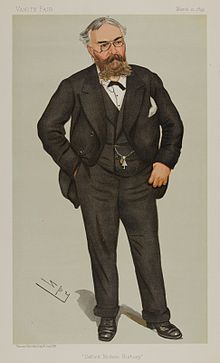York Powell
| Frederick York Powell | |
|---|---|

Powell as caricatured by Spy (Leslie Ward) in Vanity Fair, March 1895
|
|
| Born |
4 January 1850 43 Woburn Place, Bloomsbury, London |
| Died | 8 May 1904 (aged 54) Staverton Grange, Banbury Road, Oxford |
| Resting place | Wolvercote, Oxford |
| Nationality | British |
| Education | Rugby School |
| Alma mater | Oriel College, Oxford |
| Occupation | Historian |
| Title | Regius Professor of Modern History |
| Term | 1894–1904 |
| Predecessor | James Anthony Froude |
| Successor | Charles Harding Firth |
Frederick York Powell (4 January 1850 – 8 May 1904), was an English historian and scholar.
Frederick York Powell was born in Bloomsbury, London. Much of his childhood was spent in France and Spain, so that he early acquired a mastery of the language of both countries and an insight into the genius of the people. He was educated at Rugby School, and matriculated at Oxford as an unattached student, subsequently joining Christ Church, where he took a first-class in law and modern history in 1872. He was called to the bar at the Middle Temple in 1874, and married in the same year.
He became law-lecturer and tutor of Christ Church, fellow of Oriel College, delegate of the Clarendon Press, and in 1894 he was made Regius Professor of Modern History in succession to J. A. Froude. His contributions to history were not extensive, but he was a particularly stimulating teacher. He had been attracted in his school days to the study of Scandinavian history and literature, and he was closely allied with Professor Guðbrandur Vigfússon (d. 1889), whom he assisted in his Icelandic Prose Reader (1897), Corpus Poeticum Boreale (1887), and Origines Islandicae (1905), and in the editing of the Grimm Centenary papers (1886).
He took a keen interest in the development of modern French poetry, and Paul Verlaine, Stéphane Mallarmé and Emile Verhaeren all lectured at Oxford under his auspices. He was also a connoisseur in Japanese art. In politics his sympathies were with the oppressed of all nationalities; he had befriended refugees after the Commune, counting among his friends Jules Vallès the author of Les Réfractaires; and he was also a friend of Stepniak and his circle.
...
Wikipedia
